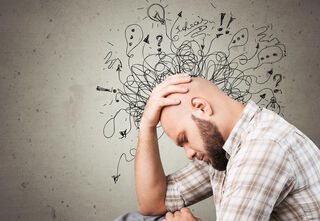
Source: Billion Photos/Shutterstock
Prior to the COVID-19 pandemic, the National Institute of Mental Health estimated that nearly one third of American adults experienced an anxiety disorder at some point in their lives.i Even more concerning, “normal” healthy children in the U.S. today appear to have higher levels of anxiety than hospitalized psychiatric patients from the mid 1950s.ii
Why are we so anxious today? We have turned anxiety into something to fear. When we feel anxious, we immediately try to rid ourselves of its uncomfortable thoughts and sensations. In doing so, however, we create more anxiety.
I would like to propose an alternative approach: We need to interpret our anxiety not as something to overcome, but something that can potentially enhance our lives. Anxiety can make us more successful and increase our capacity for emotional connection.
At a bare minimum, anxiety is like a smoke alarm. If the alarm goes off because you left the burner on under a skillet after you finished cooking, it’s not a bad thing; it’s a good thing. The alarm alerts us that we have a problem to deal with, and as long as we heed the sound of that alarm early enough and take appropriate action (e.g., turn off the burner) we can be perfectly fine. However, if we overreact to the alarm, we can make a bad situation out of a potentially positive one. Worse yet, if we disconnect the alarm because the constant blaring is disturbing and upsetting—well, we may end up burning down the house.
Psychologist David Barlow, an expert on anxiety disorders, has expressed a deep appreciation for the paradoxical benefits of anxiety. He put it this way in one of his most influential books:iii
Without anxiety, little would be accomplished. The performance of athletes, entertainers, executives, artisans, and students would suffer; creativity would diminish; crops might not be planted. And we would all achieve that idyllic state long sought after in our fast paced society of whiling away our lives under a shade tree. This would be as deadly for the species as nuclear war.
Along these lines, anxiety may be an indication of higher intelligence. There is a burgeoning body of research to suggest that individuals with anxiety disorders have higher IQ scores than “healthy” people.iv
My own clinical experience bears out that patients with high levels of anxiety are often more conscientious and have a stronger sense of being driven to do big things. I believe this is because anxiety can be harnessed to create greater awareness of oneself, and greater awareness of other people’s needs.
It is therefore no surprise that some of the most successful people in history have had significant anxiety. Mark Twain, for example, is known to have struggled mightily with his mental health, including experiencing anxiety symptoms, particularly during the latter part of his life.
For modern entertainers, much the same is true. Dick Cavett, once a leading talk show host, has undergone electroconvulsive therapy in his fight against decades of anxiety and depression. Comic actor Jim Carrey has also acknowledged that he suffered from anxiety and depression and took Prozac for years (although he stopped because it didn’t help him).Numerous pop stars also have acknowledged suffering intense anxiety, panic attacks, and clinical depression, from Selena Gomez and Adele to Lady Gaga and Bruce Springsteen. The latter revealed that he suffered two emotional breakdowns and believes he should have been hospitalized for one of them. Many people are amazed to learn that performers who project so much energy onstage could also suffer from anxiety and depression.
Beyond success and performance enhancement, anxiety can also enhance our relationships with ourselves, and others. When we listen to our anxiety instead of shutting it out or focusing on getting rid of it, we are more likely to realize when we are struggling and need to de-stress. In fact, anxiety can improve our physical health: Heeding the call of our anxiety by increasing our sleep, exercise, and social activity; reducing unnecessary demands; and rebalancing our priorities can even be life-saving.
Anxiety can also remind us of the need to be compassionate to ourselves. When we respond to anxiety by recognizing and accepting our natural human limits, we deepen our appreciation for our own experience and thereby practice something sorely lacking in society: self-love.
When it comes to connecting with others, I would go as far as to say that it is potentially easier to develop thriving, loving relationships when one is anxious. This is because anxiety provides opportunities to be vulnerable and share our inner fears, thereby giving others an opportunity to take care of us. Receiving love is a necessary component of any close connection, so when we let go of our need for control and accept the care and support that others wish to bestow upon us, we literally create more love in our lives.
In sum, when we stop fearing anxiety and trying to rid ourselves of its effects, anxiety can be a blessing. It can be a key motivator, help us realize our dreams, and facilitate closer relationships with ourselves and others.

